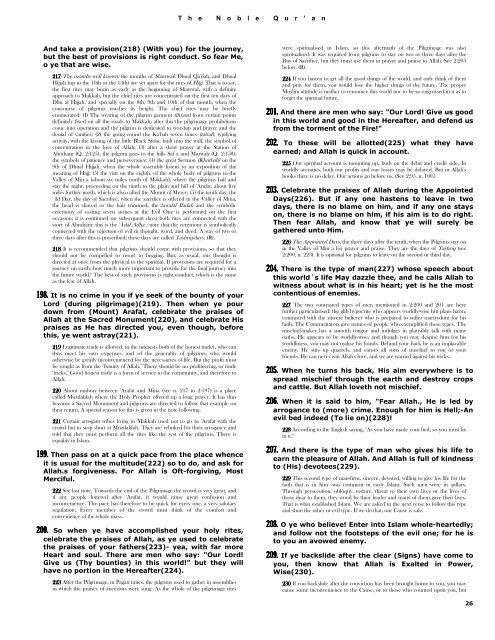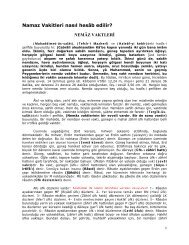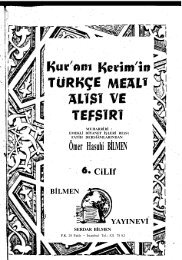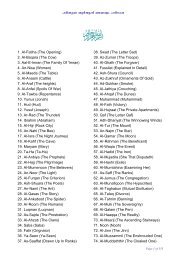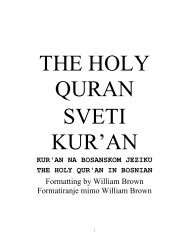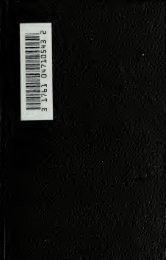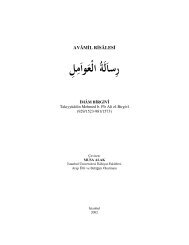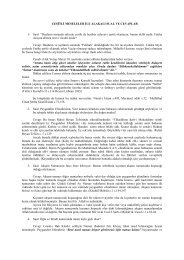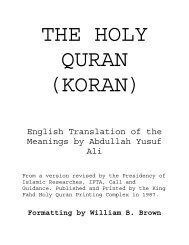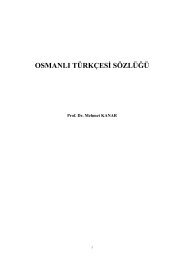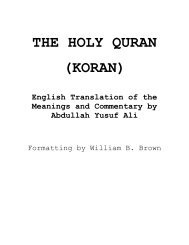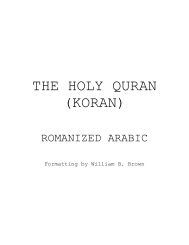English Quran with Commentaries By Yusuf-ali - HolyBooks.com
English Quran with Commentaries By Yusuf-ali - HolyBooks.com
English Quran with Commentaries By Yusuf-ali - HolyBooks.com
- No tags were found...
You also want an ePaper? Increase the reach of your titles
YUMPU automatically turns print PDFs into web optimized ePapers that Google loves.
T h e N o b l e Q u r ’ a n<br />
And take a provision(218) (With you) for the journey,<br />
but the best of provisions is right conduct. So fear Me,<br />
o ye that are wise.<br />
217 The months well known: the months of ShawwaI, Dhual Qa'dah, and Dhual<br />
Hijjah (up to the 10th or the 13th) are set apart for the rites of Hajj. That is to say,<br />
the first rites may begin as early as the beginning of Shawwal, <strong>with</strong> a definite<br />
approach to Makkah, but the chief rites are concentrated on the first ten days of<br />
Dhu al Hijjah, and specially on the 8th, 9th and 10th of that month, when the<br />
concourse of pilgrims reaches its height. The chief rites may be briefly<br />
enumerated: (I) The wearing of the pilgrim garment (ihram) from certain points<br />
definitely fixed on all the roads to Makkah; after this the pilgrimage prohibitions<br />
<strong>com</strong>e into operation and the pilgrim is dedicated to worship and prayer and the<br />
denial of vanities: (2) the going round the Ka'bah seven times (tawaf), typifying<br />
activity, <strong>with</strong> the kissing of the little Black Stone built into the wall, the symbol of<br />
concentration in the love of Allah; (3) after a short prayer at the Station of<br />
Abraham (Q. 2:125), the pilgrim goes to the hills Saf a and Marwah (Q. 2:158),<br />
the symbols of patience and perseverance; (4) the great Sermon (Khutbah) on the<br />
9th of Dhual Hijjah. when the whole assembly listens to an exposition of the<br />
meaning of Hajj; (5) the visit on the eighth, of the whole body of pilgrims to the<br />
Valley of Min a (about six miles north of Makkah), where the pilgrims halt and<br />
stay the night, proceeding on the ninth to the plain and hill of 'Arafat, about five<br />
miles further north, which is also called the Mount of Mercy; (5) the tenth day, the<br />
' Id Day, the day of Sacrifice, when the sacrifice is offered in the Valley of Mina,<br />
the head is shaved or the hair trimmed, the tawafal Ifadah and the symbolic<br />
ceremony of casting seven stones at the Evil One is performed on the first<br />
occasion; it is continued on subsequent days; both rites are connected <strong>with</strong> the<br />
story of Abraham: this is the ' Idal Adha ; note that the ceremony is symbolically<br />
connected <strong>with</strong> the rejection of evil in thought, word, and deed. A stay of two or<br />
three days after this is prescribed; these days are called Tashriq days. (R).<br />
218 It is re<strong>com</strong>mended that pilgrims should <strong>com</strong>e <strong>with</strong> provisions, so that they<br />
should not be <strong>com</strong>pelled to resort to begging. But, as usual, our thought is<br />
directed at once from the physical to the spiritual. If provisions are required for a<br />
journey on earth, how much more important to provide for the final journey into<br />
the future world? The best of such provisions is right conduct, which is the same<br />
as the fear of Allah.<br />
198. It is no crime in you if ye seek of the bounty of your<br />
Lord (during pilgrimage)(219). Then when ye pour<br />
down from (Mount) Arafat, celebrate the praises of<br />
Allah at the Sacred Monument(220), and celebrate His<br />
praises as He has directed you, even though, before<br />
this, ye went astray(221).<br />
219 Legitimate trade is allowed, in the interests both of the honest trader, who can<br />
thus meet his own expenses, and of the gener<strong>ali</strong>ty of pilgrims, who would<br />
otherwise be greatly inconvenienced for the necessaries of life. But the profit must<br />
be sought as from the "bounty of Allah." There should be no profiteering, or trade<br />
"tricks." Good honest trade is a form of service to the <strong>com</strong>munity, and therefore to<br />
Allah.<br />
220 About midway between 'Arafat and Mina (see n. 217 to 2:197) is a place<br />
called Muzd<strong>ali</strong>fah where the Holy Prophet offered up a long prayer. It has thus<br />
be<strong>com</strong>e a Sacred Monument and pilgrims are directed to follow that example on<br />
their return. A special reason for this is given in the note following.<br />
221 Certain arrogant tribes living in Makkah used not to go to 'Arafat <strong>with</strong> the<br />
crowd but to stop short at Muzd<strong>ali</strong>fah. They are rebuked for their arrogance and<br />
told that they must perform all the rites like the rest of the pilgrims. There is<br />
equ<strong>ali</strong>ty in Islam.<br />
199. Then pass on at a quick pace from the place whence<br />
it is usual for the multitude(222) so to do, and ask for<br />
Allah.s forgiveness. For Allah is Oft-forgiving, Most<br />
Merciful.<br />
222 See last note. Towards the end of the Pilgrimage the crowd is very great, and<br />
if any people loitered after 'Arafat, it would cause great confusion and<br />
inconvenience. The pace has therefore to be quick for every one, a very salutary<br />
regulation. Every member of the crowd must think of the <strong>com</strong>fort and<br />
convenience of the whole mass.<br />
200. So when ye have ac<strong>com</strong>plished your holy rites,<br />
celebrate the praises of Allah, as ye used to celebrate<br />
the praises of your fathers(223)- yea, <strong>with</strong> far more<br />
Heart and soul. There are men who say: "Our Lord!<br />
Give us (Thy bounties) in this world!" but they will<br />
have no portion in the Hereafter(224).<br />
223 After the Pilgrimage, in Pagan times, the pilgrims used to gather in assemblies<br />
in which the praises of ancestors were sung. As the whole of the pilgrimage rites<br />
were spiritu<strong>ali</strong>sed in Islam, so this aftermath of the Pilgrimage was also<br />
spiritu<strong>ali</strong>sed. It was required from pilgrims to stay on two or three days after the<br />
Day of Sacrifice, but they must use them in prayer and praise to Allah. See 2:203<br />
below. (R).<br />
224 If you hasten to get all the good things of the world, and only think of them<br />
and pray for them, you would lose the higher things of the future. The proper<br />
Muslim attitude is neither to renounce this world nor to be so engrossed in it as to<br />
forget the spiritual future.<br />
201. And there are men who say: "Our Lord! Give us good<br />
in this world and good in the Hereafter, and defend us<br />
from the torment of the Fire!"<br />
202. To these will be allotted(225) what they have<br />
earned; and Allah is quick in account.<br />
225 Our spiritual account is mounting up, both on the debit and credit side. In<br />
worldly accounts, both our profits and our losses may be delayed. But in Allah's<br />
books there is no delay. Our actions go before us. (See 2:95. n. 100.)<br />
203. Celebrate the praises of Allah during the Appointed<br />
Days(226). But if any one hastens to leave in two<br />
days, there is no blame on him, and if any one stays<br />
on, there is no blame on him, if his aim is to do right.<br />
Then fear Allah, and know that ye will surely be<br />
gathered unto Him.<br />
226 The Appointed Days: the three days after the tenth, when the Pilgrims stay on<br />
in the Valley of Min a for prayer and praise. They are the days of Tashriq (see<br />
2:200, n. 223). It is optional for pilgrims to leave on the second or third day.<br />
204. There is the type of man(227) whose speech about<br />
this world´s life May dazzle thee, and he calls Allah to<br />
witness about what is in his heart; yet is he the most<br />
contentious of enemies.<br />
227 The two contrasted types of men mentioned in 2:200 and 201 are here<br />
further particularised: the glib hypocrite who appears worldly-wise but plans harm,<br />
contrasted <strong>with</strong> the sincere believer who is prepared to suffer martyrdom for his<br />
faith. The Commentators give names of people who exemplified these types. The<br />
mischief-maker has a smooth tongue and indulges in plausible talk <strong>with</strong> many<br />
oaths. He appears to be worldly-wise, and though you may despise him for his<br />
worldliness, you may not re<strong>ali</strong>se his frauds. Behind your back he is an implacable<br />
enemy. He stirs up quarrels, and causes all sorts of mischief to you or your<br />
friends. He can never win Allah's love, and we are warned against his tricks.<br />
205. When he turns his back, His aim everywhere is to<br />
spread mischief through the earth and destroy crops<br />
and cattle. But Allah loveth not mischief.<br />
206. When it is said to him, "Fear Allah., He is led by<br />
arrogance to (more) crime. Enough for him is Hell;-An<br />
evil bed indeed (To lie on)(228)!<br />
228 According to the <strong>English</strong> saying, "As you have made your bed, so you must lie<br />
in it."<br />
207. And there is the type of man who gives his life to<br />
earn the pleasure of Allah. And Allah is full of kindness<br />
to (His) devotees(229).<br />
229 This second type of man-firm, sincere, devoted, willing to give his life for the<br />
faith that is in him -was <strong>com</strong>mon in early Islam. Such men were its pillars.<br />
Through persecution, obloquy, torture, threat to their own lives or the lives of<br />
those dear to them, they stood by their leader and many of them gave their lives.<br />
That is what established Islam. We are asked in the next verse to follow this type<br />
and shun the other or evil type. If we do that, our Cause is safe.<br />
208. O ye who believe! Enter into Islam whole-heartedly;<br />
and follow not the footsteps of the evil one; for he is<br />
to you an avowed enemy.<br />
209. If ye backslide after the clear (Signs) have <strong>com</strong>e to<br />
you, then know that Allah is Exalted in Power,<br />
Wise(230).<br />
230 If you backslide after the conviction has been brought home to you, you may<br />
cause some inconvenience to the Cause, or to those who counted upon you, but<br />
26


